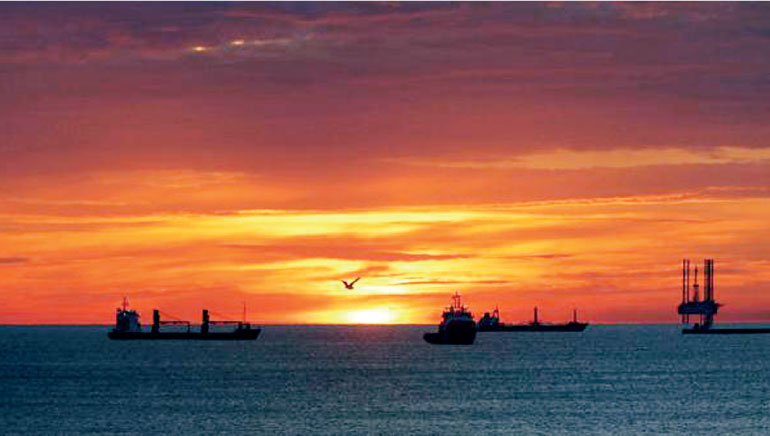Sunday Mar 01, 2026
Sunday Mar 01, 2026
Monday, 19 March 2018 00:55 - - {{hitsCtrl.values.hits}}

A seagull flies by as cargo ships and an offshore supply vessel lie at anchor at sunrise off Sousse, Tunisia February 14, 2018. Picture taken February 14, 2018 - REUTERS
Paris (Reuters): The global economy will see its strongest growth in seven years in 2018 thanks to a rebound in trade and investment, the OECD said last week, while also warning a trade war could threaten the improved outlook.
Updating its outlook for G20 economies, the Organisation for Economic Cooperation and Development raised its global growth forecast for both 2018 and 2019 to 3.9% – thehighest since 2011 – froma previous estimate of 3.6% for both years.
The raised forecast was in part due to expectations that US tax cuts would boost the world’s biggest economy, it said.
“We think that the stronger economy is here to stay for the next couple years,” acting OECD Chief Economist Alvaro Pereira told Reuters.“We are getting back to more normal circumstances than what we’ve seen in the last 10 years.”
Rebounding global business investment would keep global trade growth at about 5% this year, the OECD forecast.
However, it said the global economy was vulnerable to an eruption of trade tensions after the Trump administration slapped import tariffs on steel and aluminium.
“This could obviously threaten the recovery. Certainly we believe this is a significant risk, so we hope that it doesn’t materialise because it would be fairly damaging,” Pereira said.
The OECD forecast the US economy would grow 2.9% this year and 2.8% in 2019, with tax cuts adding 0.5-0.75%points to the outlook in both years.
Against that backdrop, the Federal Reserve would probably have to raise interest rates four times this year as inflation picked up, Pereira said. Previously the OECD had estimated three hikes would suffice this year.
Among other hot economies, stronger growth in France and Germany boosted the outlook for the broader euro zone to 2.3% for this year and 2.1% in 2019. Previously, the OECD had forecast 2.1% and 1.9% respectively. Fiscal easing in Germany’s coalition agreement was seen lifting growth in the euro zone’s biggest economy to 2.4% this year (+0.1% point) and 2.2% in 2019 (+0.3).
President Emmanuel Macron’s social welfare, tax and labour market reforms would help France narrow the gap with Germany, with growth forecast at an 11-year high of 2.2% (+0.4) before easing to 1.9% in 2019 (+0.2).
However,Britain was seen missing out on the global upturn, lagging all other G20 countries with growth of only 1.3% this year, although up from a November forecast of 1.2% due to the broader global improvement.
With Britain due to leave the European Union next year, its economic growth was seen easing to 1.1% in 2019, unchanged from the OECD’s November estimate.